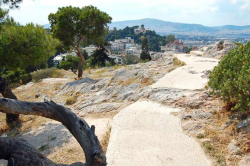Areopagus (Ancient Court)

Areopagus (Ancient Court)
The name "Areopagus" translates to "Ares' Rock," a reference rooted in Greek mythology where Ares, the god of war, was said to have been tried here for the murder of Poseidon's son, Alirrothios. This legendary trial set the precedent for the rock's long-standing association with justice and law.
In historical terms, the Areopagus was the meeting place of the oldest council of ancient Athens, the Areopagus Council. Comprising former archons or city-state leaders, this body was responsible for deciding on critical matters ranging from law and order to moral and religious issues. In the democratic reforms of the 5th century B.C. led by Ephialtes, the council's powers were significantly curtailed, transferring much of its authority to the more democratic institutions of Athens. Despite this, the Areopagus continued to play a vital role in overseeing legal matters, particularly those related to homicide.
The rock itself, accessible via a stone pathway near the entrance to the Acropolis, offers a breathtaking view of Athens, including the Ancient Agora, the heart of Athenian democracy. Visitors today can walk in the footsteps of ancient jurors and orators, reflecting on the profound historical events that took place on this ground.
The Areopagus also holds a significant place in Christian history. It was here that Apostle Paul delivered his famous sermon to the Athenians about "the unknown god," marking a pivotal moment in the spread of Christianity in the pagan world.
In conclusion, the Areopagus is not just a physical landmark but a symbol of the complex interplay between mythology, law, and society in ancient Athens. Its enduring legacy reminds us of the city's contribution to the principles of justice and governance that underpin modern societies.
Today, it is nothing more than a wonderful archaeological sight for visitors that give the best background of the Acropolis Hill for especially nice photographs and selfies.








